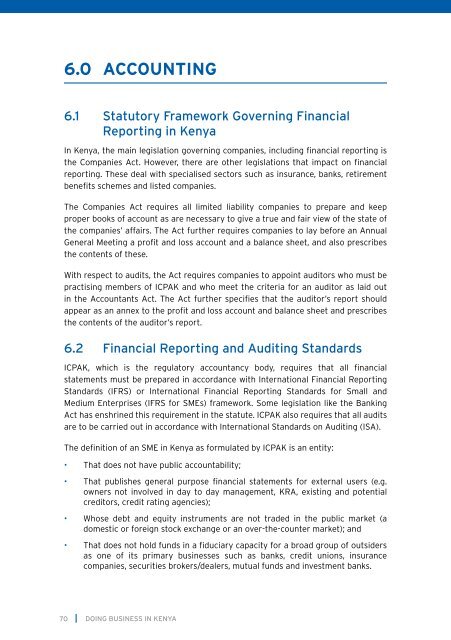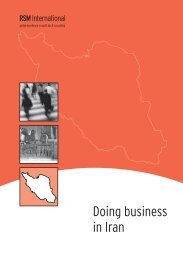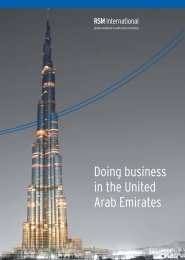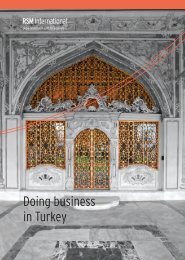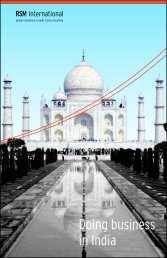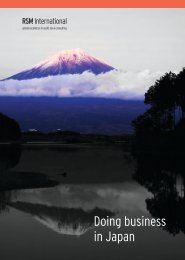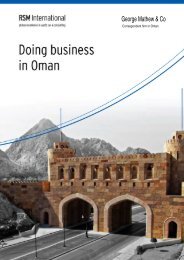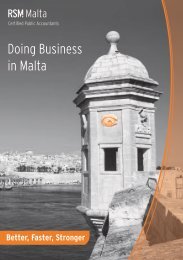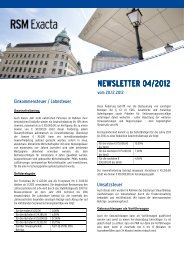Doing Business in Kenya - RSM International
Doing Business in Kenya - RSM International
Doing Business in Kenya - RSM International
- No tags were found...
You also want an ePaper? Increase the reach of your titles
YUMPU automatically turns print PDFs into web optimized ePapers that Google loves.
6.0 ACCOUNTING6.1 Statutory Framework Govern<strong>in</strong>g F<strong>in</strong>ancialReport<strong>in</strong>g <strong>in</strong> <strong>Kenya</strong>In <strong>Kenya</strong>, the ma<strong>in</strong> legislation govern<strong>in</strong>g companies, <strong>in</strong>clud<strong>in</strong>g f<strong>in</strong>ancial report<strong>in</strong>g isthe Companies Act. However, there are other legislations that impact on f<strong>in</strong>ancialreport<strong>in</strong>g. These deal with specialised sectors such as <strong>in</strong>surance, banks, retirementbenefits schemes and listed companies.The Companies Act requires all limited liability companies to prepare and keepproper books of account as are necessary to give a true and fair view of the state ofthe companies’ affairs. The Act further requires companies to lay before an AnnualGeneral Meet<strong>in</strong>g a profit and loss account and a balance sheet, and also prescribesthe contents of these.With respect to audits, the Act requires companies to appo<strong>in</strong>t auditors who must bepractis<strong>in</strong>g members of ICPAK and who meet the criteria for an auditor as laid out<strong>in</strong> the Accountants Act. The Act further specifies that the auditor’s report shouldappear as an annex to the profit and loss account and balance sheet and prescribesthe contents of the auditor’s report.6.2 F<strong>in</strong>ancial Report<strong>in</strong>g and Audit<strong>in</strong>g StandardsICPAK, which is the regulatory accountancy body, requires that all f<strong>in</strong>ancialstatements must be prepared <strong>in</strong> accordance with <strong>International</strong> F<strong>in</strong>ancial Report<strong>in</strong>gStandards (IFRS) or <strong>International</strong> F<strong>in</strong>ancial Report<strong>in</strong>g Standards for Small andMedium Enterprises (IFRS for SMEs) framework. Some legislation like the Bank<strong>in</strong>gAct has enshr<strong>in</strong>ed this requirement <strong>in</strong> the statute. ICPAK also requires that all auditsare to be carried out <strong>in</strong> accordance with <strong>International</strong> Standards on Audit<strong>in</strong>g (ISA).The def<strong>in</strong>ition of an SME <strong>in</strong> <strong>Kenya</strong> as formulated by ICPAK is an entity:• That does not have public accountability;• That publishes general purpose f<strong>in</strong>ancial statements for external users (e.g.owners not <strong>in</strong>volved <strong>in</strong> day to day management, KRA, exist<strong>in</strong>g and potentialcreditors, credit rat<strong>in</strong>g agencies);• Whose debt and equity <strong>in</strong>struments are not traded <strong>in</strong> the public market (adomestic or foreign stock exchange or an over-the-counter market); and• That does not hold funds <strong>in</strong> a fiduciary capacity for a broad group of outsidersas one of its primary bus<strong>in</strong>esses such as banks, credit unions, <strong>in</strong>surancecompanies, securities brokers/dealers, mutual funds and <strong>in</strong>vestment banks.70DOING BUSINESS IN KENYA


